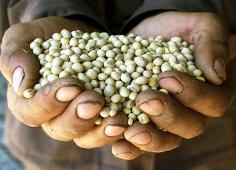 Dismissing Parliamentary panel's suggestion to halt all field trials of GM crops, Agriculture Minister Sharad Pawar has said the government can't take 'luxurious decision of banning' them because such kind of farm research is important for ensuring food security.
Dismissing Parliamentary panel's suggestion to halt all field trials of GM crops, Agriculture Minister Sharad Pawar has said the government can't take 'luxurious decision of banning' them because such kind of farm research is important for ensuring food security.
In August, the Parliamentary Standing Committee on Agriculture, headed by Basudeb Acharia, had recommended to the government to stop all open-field trials of transgenic crops until it develops a better system of monitoring and oversight.
The panel had also called for a complete overhaul of the regulatory system and thorough probe into how permission was initially granted in 2009 to commercialise Bt brinjal.
"We are not supporting that (Panel's recommendations).
"Ultimately, food security is the important issue for a nation like India and here we cannot take this type of luxurious decision of banning field trials," Pawar told PTI in an interview.
Research in Genetically Modified crops and their field trials should continue in a country which has huge population, he said.
Pawar said, however, that caution should be exercised while allowing GM crops for commercial cultivation.
"We have
Meanwhile, sources said the ministry in the Action Taken Report on the panel's contention has stated: "Ban on GM crop field trails will be highly detrimental and not in the national interest.
"Adoption of this recommendation would bring to a halt the process of testing the safety of GM crops."
The government has allowed commercial cultivation of BT cotton, while moratorium has been put on Bt brinjal.
Permission has been given to private companies to conduct field trials of GM crops such as cotton, corn and maize in Punjab, Haryana, Andhra Pradesh and Gujarat.
Rangarajan said trade deficit was rising because imports are increasing due to the growth the country is experiencing, while rise in exports was subdued.
With falling tax-GDP ratio, he said, the government would also have to work on the expenditure side, particularly the subsidies.
The GDP growth by the end of March 2013 is expected to be closer to 6 per cent and would be 7 per cent in 2013-14.
"We will be able to get back to 8 per cent growth, and 9 per cent if the international factors were favourable", he added.








 © 2025
© 2025